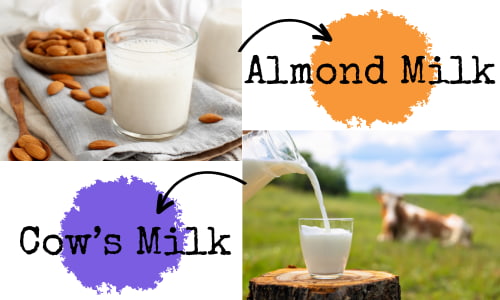Curious about whether almond milk could be the reason behind your digestive issues? Does almond milk make you constipated? Almond milk generally does not cause constipation. In fact, it’s mostly water, which can help keep your digestive system running smoothly. Cool, huh?
Some people might experience digestive issues from almond milk, particularly due to ingredients in the milk like carrageenan, (found in some brands). Additionally, if you have a tree nut allergy, you might find almond milk hard to digest.
Despite these exceptions, almond milk is often considered a good choice for those looking to switch from cow’s milk. Almond milk has fiber and helps you to stay hydrated, both of which are beneficial for your digestive system!
Table of Contents:
- All About Constipation
- What’s in Almond Milk?
- Almond Milk and Digestive Health
- Alternative Dietary Choices
- Prevention and Management of Constipation
- Wrap-up: So, Does Almond Milk Make You Constipated?
All About Constipation
Constipation is a common digestive issue that can affect your daily life. It involves infrequent bowel movements and difficulty passing stool.
Constipation Symptoms and Causes
Constipation may present with symptoms like hard or lumpy stools, straining during bowel movements, and a feeling of incomplete evacuation.
You might also experience bloating and abdominal pain. Common causes of constipation include lack of fiber in your diet, dehydration, and a sedentary lifestyle. Stress and certain medications can also contribute to constipation.
Diet and Your Digestive Health
Your diet plays a critical role in maintaining digestive health. Eating foods high in fiber such as fruits, vegetables, and whole grains can prevent constipation.
Fiber increases the bulk and softness of your stool, making it easier to pass. On the other hand, a diet high in processed foods and low in fiber can actually lead to digestive issues and constipation.
Hydration and Bowel Movements
Staying hydrated is so important for preventing constipation. Water helps to soften your stool, making it easier to move through your intestines.
Aiming to drink at least 8 glasses of water a day is a great way to stay hydrated. Other fluids like herbal teas can also help. Additionally, foods high in water can help you stay hydrated!
Cucumber, watermelon, strawberries, oranges, celery, pomegranates, and bell peppers are all great choices.
Dehydration can lead to hard stools and make bowel movements more difficult and painful to pass. Hydration is essential, so drink (or eat) up!
What’s in Almond Milk?
Almond milk boasts a unique nutritional profile that distinguishes it from traditional dairy milk. It is known for being low in calories, high in vitamin E, and it’s often fortified with other essential nutrients like calcium and vitamin D.
Nutrition Content of Almond Milk
Almond milk is a low-calorie drink, making it a popular choice for those who want to manage their weight. A cup of almond milk typically contains around 30–50 calories, depending on the brand and whether it’s sweetened or unsweetened.
One of the key nutrients in almond milk is vitamin E. This antioxidant helps protect your cells from damage and supports skin health. A single cup of almond milk can provide about 20–50% of your daily recommended intake.
Almond milk is also often fortified with calcium and vitamin D to mimic the nutrient profile of dairy milk, making it a viable alternative for those who are lactose intolerant or are avoiding dairy.
While almond milk contains small amounts of fiber and fat, it is actually pretty low in protein compared to dairy milk. Overall, almond milk offers a nutrient-rich profile that can fit into a balanced diet.
Almond Milk vs Dairy Milk
Dairy milk naturally contains more protein than almond milk, typically offering 8 grams of protein per cup compared to almond milk’s 1 gram. This makes dairy milk a better option for those looking to increase their protein intake.
In terms of calories, almond milk is generally lower. Unsweetened almond milk can have as few as 36 calories per cup, while a cup of whole dairy milk contains around 150 calories. This makes almond milk a better choice for low-calorie diets.
As we mentioned above, almond milk is often fortified with calcium and vitamin D, which are naturally present in dairy milk.
For those with lactose intolerance or dairy allergies, almond milk offers a digestible alternative without the gastrointestinal discomfort that dairy might cause.
| Almond Milk | 2% Milk | Whole Milk | |
| Serving Size | 1 cup | 1 cup | 1 cup |
| Calories | 36 | 122 | 150 |
| Protein | 1 gram | 8 grams | 8 grams |
| Fat | 3 grams | 4.6 grams | 7.8 grams |
| Carbohydrate | 0.8 grams | 12 grams | 11.3 grams |
| Fiber | 0 grams | 0 grams | 0 grams |

Almond Milk and Digestive Health
Almond milk affects your digestive system differently based on its ingredients and how much of it you drink. It can help people who are lactose intolerant by providing a plant-based alternative to dairy products.
Can Almond Milk Make You Constipated?
Does almond milk make you constipated? Almond milk’s impact on constipation varies.
Some sources suggest that it doesn’t cause constipation because it’s mostly water, which aids digestion by drawing fluids into your bowels and making it easier to move waste through your system.
Ingredients like carrageenan, used as a thickener, can cause digestive issues, including bloating and constipation, for some people. Carrageenan is acquired from red algae and may irritate your gut.
Additionally, some almond milks are made with calcium carbonate – which can also cause constipation when consumed in excess.
Benefits of Almond Milk for Those Who Are Lactose Intolerant
If you’re lactose intolerant, almond milk is a great alternative to dairy milk. It doesn’t contain lactose, which is the sugar in milk that can cause bloating, diarrhea, and stomach pain in those with lactose intolerance.
Plant-based milk like almond milk can be a good part of your diet. Almond milk provides essential nutrients without the downsides of lactose.
While it may lack the natural probiotics found in some dairy products, it still offers benefits like being low in calories and having a good amount of water, which can aid your digestion.
Switching to almond milk can make your digestive system happier if you’re sensitive to lactose, helping you avoid the discomfort usually caused by dairy products.
Drinking almond milk can contribute to a balanced diet, especially with its added vitamins like D and E, which support overall health.
Alternative Dietary Choices
When considering alternatives to avoid potential constipation from almond milk, focusing on high-fiber foods for bowel health, non-dairy sources of calcium, and maintaining a balanced diet is crucial.
High Fiber Foods for Bowel Health
High fiber foods are important for keeping your digestive system running smoothly. Whole grains, such as brown rice and oats, provide a good amount of fiber. Vegetables like broccoli, carrots, and spinach are also excellent choices.
Fruits including apples, pears, and berries offer a mix of soluble and insoluble fiber. Legumes, like beans and lentils, are packed with fiber and nutrients.
Incorporating nuts such as walnuts and almonds can also help. Remember, dietary fiber adds bulk to your stool, making it easier to pass.

Non-dairy Food Sources of Calcium
If you are avoiding almond milk but still need calcium, there are many non-dairy options. Leafy greens such as kale and bok choy are high in calcium. Fortified products like orange juice and plant-based milks (e.g., soy milk) often contain added calcium and vitamin D.
Tofu is another excellent source, especially when it’s made with calcium sulfate. Including seeds such as chia seeds and sesame seeds in your meals can also provide a calcium boost.
Oat milk and soy milk are often fortified with calcium and can be another great option for a non-dairy milk!
The Importance of a Balanced Diet
Maintaining a balanced diet can be helpful in preventing constipation and ensuring overall health. A diet rich in many different nutrients supports your digestive function!
Foods like whole grains, vegetables, fruits, legumes, and nuts and seeds are great to add to your meals and snacks.
Eating a variety of foods ensures you get enough vitamins and minerals. Drinking plenty of water is crucial, as it helps fiber work effectively in your digestive system.
Prevention and Management of Constipation
Preventing and managing constipation involves making changes in diet, lifestyle, and sometimes consulting a healthcare provider. Staying hydrated and consuming enough fiber are also important!
Tips for Preventing Constipation
To prevent constipation, aim to eat a diet high in fiber. Foods like fruits, vegetables, whole grains, beans, and legumes can help to maintain regular bowel movements.
Drink plenty of fluids like water or herbal teas to keep your digestive system working well! It might also help to try and avoid drinks that can dehydrate you, like coffee and alcohol.
Regular exercise is also important. Activities like walking, yoga, or swimming can keep things moving in your intestines.
To summarize:
- Eat more fiber: Fruits, vegetables, whole grains
- Drink lots of water: Keeps your digestive system hydrated
- Exercise regularly: Promotes regular bowel movements
- Manage stress: Techniques like deep breathing or meditation
When to Consult Your Healthcare Provider
If you experience chronic constipation or severe symptoms such as persistent bloating or abdominal pain, then it’s time to consult your healthcare provider.
They can evaluate whether your constipation might be related to a more serious condition, or if the medications you’re taking could be contributing factors.
Your healthcare provider can also refer you to a registered dietitian who can recommend dietary changes, or your healthcare provider can prescribe medications to alleviate your symptoms.
Contacting a healthcare provider becomes crucial if:
- Symptoms persist: Constant or severe constipation
- Additional symptoms: Bloating, severe abdominal pain
- Potential medication issues: Medications interfering with bowel movements
- Need for professional advice: Dietary changes or specific treatments
Regular consultation can help you manage symptoms effectively and maintain better digestive health.
Wrap-up: So, Does Almond Milk Make You Constipated?
Does Almond Milk Make You Constipated? Almond milk is usually safe and doesn’t cause constipation for most people. It mainly consists of water and small amounts of fat, carbohydrates, and protein.
Fortified almond milk includes added vitamins and minerals, such as calcium and vitamin D. These added ingredients can sometimes impact digestion.
Some individuals may react to other ingredients found in almond milk, like carrageenan. Carrageenan can sometimes lead to gas, bloating, and constipation.
If you have a tree nut allergy or sensitivity, almond milk might cause digestive issues. In such cases, consider alternative milk options like oat milk or soy milk.
To summarize, while almond milk generally should not cause constipation, it varies from person to person. Pay attention to how your body responds to it. If you experience discomfort, switching to another non-dairy milk could help.
